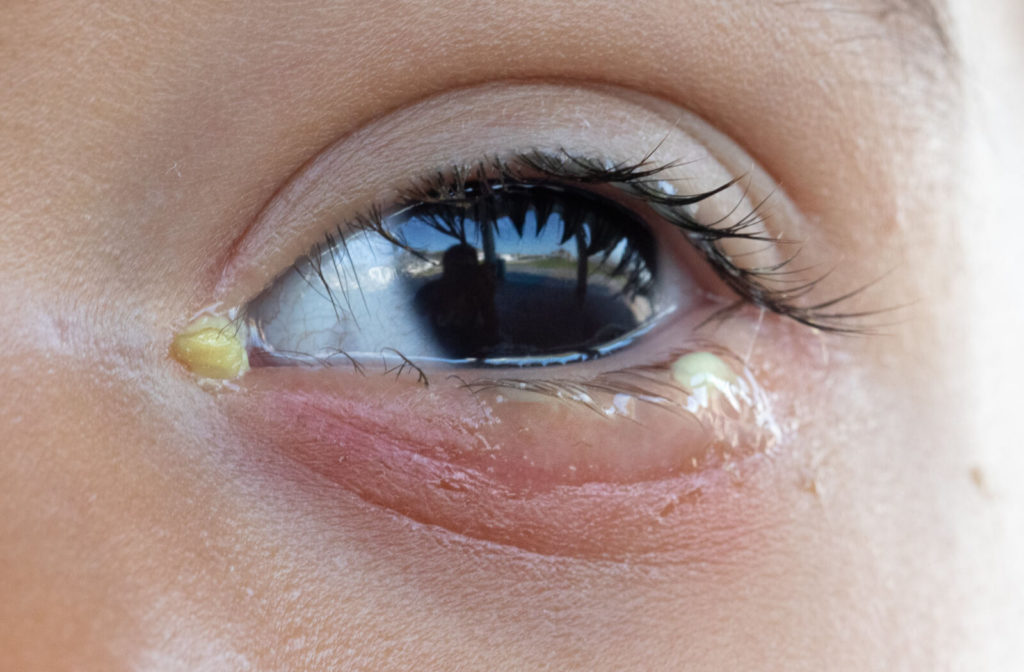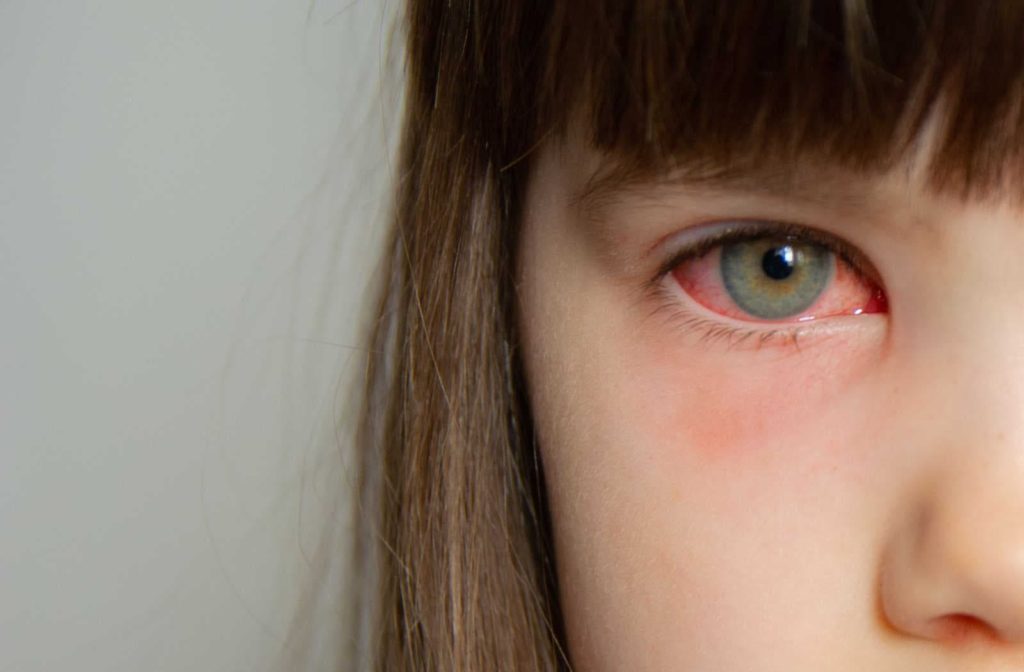As a parent, you probably know kids can get into all sorts of mischief. And sometimes, that mischief can lead to pink eye! Pink eye is a common eye infection kids can pick up from daycare, school, or even just playing with friends. Some forms are highly contagious and can spread quickly from one kid to another.
Your optometrist can diagnose pink eye with an eye exam, but if you notice redness, stringy mucus, and your kid rubbing their eyes, it may be time for a check-up. Recognizing the symptoms of pink eye is the first step toward effective treatment.
Causes of Pink Eye
Pink eye, also known as conjunctivitis, is characterized by inflammation of the conjunctiva, the transparent membrane that covers the eye’s white part and the inside of the eyelid. There are several types of conjunctivitis, each with its specific causes and treatment options.
The most common types of pink eye are viral, bacterial, and allergic conjunctivitis.
Viral Conjunctivitis
Viral conjunctivitis is the most common type of pink eye, accounting for up to 75% of cases. A virus, such as the common cold virus, usually causes it. Viral pink eye is very contagious, so your kid might easily catch it from a friend. Crowded places, such as schools or stores, can quickly transfer the virus between people.
Bacterial Conjunctivitis
If your kid doesn’t have viral conjunctivitis, the second most likely culprit is bacterial conjunctivitis. In fact, this type of pink eye is more common in children than adults. Like viral pink eye, it is highly contagious and typically occurs through direct contact with someone who has pink eye.
Allergic Conjunctivitis
A reaction to allergens such as pollen, dust, or animal dander that get in your kid’s eyes may cause allergic conjunctivitis. Because of this, it’s sometimes referred to as eye allergies. Allergic conjunctivitis is not contagious, as you need to come in direct contact with an allergen.
Symptoms of Pink Eye
Pink eye symptoms exist over a vast range. Your kid might have mild or severe symptoms, lasting from a few days to a few weeks.
While there are different types of pink eye, the most common symptoms include:
- Redness or pinkness
- Itching or burning
- Swelling
- Watery eyes
- Feeling like something is in your eye
- Stringy mucus discharge
- Eyelids or lashes crusting

Diagnosing Your Kid’s Pink Eye
Your optometrist can typically diagnose your kid’s pink eye with an eye exam. They can also test to monitor your kid’s vision and potential damage to their eyes. If your optometrist suspects your kid’s pink eye is caused by a bacterial infection, they may take a sample of the discharge from their eye to determine the type of bacteria and which antibiotic is best to treat it.
Treating Pink Eye
The proper treatment for pink eye will depend on what’s causing it. If you suspect that your kid has pink eye and it’s painful, intensely red, and the symptoms don’t improve, seek medical attention as soon as possible.
In addition to prescribed medication, you can take several self-care measures to help soothe your kid’s eyes and speed up the healing process.
- Use compresses. Applying a damp compress to your kid’s eyes can help relieve discomfort and reduce swelling. To make a compress, soak a clean washcloth in water and wring it out. Then, place the cloth over their closed eyelids for several minutes. For viral and bacterial pink eye, use warm water. For allergic pink eye, use cool water.
- Practice good hygiene. We all know kids can be messy, but to help prevent the spread of infection, you should help them practice good hygiene. Try to get them to wash their hands frequently, avoid touching their eyes, and avoid sharing personal items such as towels, washcloths, and makeup.
- Use lubricating eye drops. Over-the-counter eye drops, known as artificial tears, can be helpful in soothing painful eyes. This may also help your kid stop rubbing them, which can reduce the spread of viral and bacterial pink eye.
- Avoid contact lenses. If you have an older kid who has taken on the responsibility of wearing contact lenses, they should avoid wearing them until their symptoms have entirely resolved. This can help prevent the spread of infection and minimize irritation to their eyes.
In most cases, pink eye will clear up within a week or 2 with proper treatment and self-care. However, if their symptoms persist or worsen, you should immediately seek medical attention. Your doctor may recommend additional treatments or tests to rule out underlying medical conditions that may be contributing to their symptoms.
Preventing Pink Eye in Kids
Preventing pink eye is easier than treating it. So here are some simple steps you and your kid can take to avoid getting pink eye:
- Wash your hands. Wash your hands frequently and thoroughly with soap and warm water, especially if you’ve been in crowded or public places.
- Don’t touch your eyes. Your hands can be one of the quickest ways to spread pink eye. So avoid touching or rubbing your eyes, especially if your hands aren’t clean.
- Avoid sharing personal items. Sharing items like towels, pillows, or makeup can also spread pink eye. Be sure to avoid sharing personal items with others to reduce the risk of infection.
- Stay home when you’re sick. You can also help keep other people safe. If you have symptoms of pink eye, stay home from work or school until they’ve resolved.
- Clean your contact lenses. If you wear contact lenses, it’s essential to keep them clean and dispose of them as directed by your optometrist. This step can help prevent bacteria buildup that could cause pink eye.
Eye Care for the Whole Family
Pink eye can be frustrating for kids, and it can quickly get out of hand if you’re not careful. If your kid appears to have pink eye symptoms and they’re not going away, book an appointment with our expert team at Hercules Optometry.



